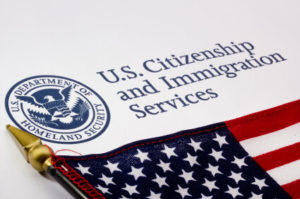USCIS to Expand In-Person Interview Requirements for Certain Permanent Residency Applicants.
U.S. Citizenship and Immigration Services (USCIS) will begin expanding in-person interviews for certain immigration benefit applicants whose benefit, if granted, would allow them to permanently reside in the United States. This change complies with Executive Order 13780, “Protecting the Nation From Foreign Terrorist Entry Into the United States,” and is part of the agency’s comprehensive strategy to further improve the detection and prevention of fraud and further enhance the integrity of the immigration system.
Effective Oct. 1, USCIS will begin to phase-in interviews for the following:
• Adjustment of status applications based on employment (Form I-485, Application to Register Permanent Residence or Adjust Status).
• Refugee/asylee relative petitions (Form I-730, Refugee/Asylee Relative Petition) for beneficiaries who are in the United States and are petitioning to join a principal asylee/refugee applicant.
Previously, applicants in these categories did not require an in-person interview with USCIS officers in order for their application for permanent residency to be adjudicated. Beyond these categories, USCIS is planning an incremental expansion of interviews to other benefit types.
“This change reflects the Administration’s commitment to upholding and strengthening the integrity of our nation’s immigration system,” said Acting USCIS Director James W. McCament. “USCIS and our federal partners are working collaboratively to develop more robust screening and vetting procedures for individuals seeking immigration benefits to reside in the United States.”
Conducting in-person interviews will provide USCIS officers with the opportunity to verify the information provided in an individual’s application, to discover new information that may be relevant to the adjudication process, and to determine the credibility of the individual seeking permanent residence in the United States. USCIS will meet the additional interview requirement through enhancements in training and technology as well as transitions in some aspects of case management.
Additionally, individuals can report allegations of immigration fraud or abuse by completing ICE’s HSI Tip Form.
For more information on USCIS and its programs, please visit uscis.gov or follow us on Twitter (@uscis), YouTube (/uscis), Facebook(/uscis) and Instagram (@USCIS).
NUEVOS REQUISITOS PARA SOLICITAR RESIDENCIA EN ESTADOS UNIDOS.
Hay nuevos requisitos para evaluar la credibilidad del solicitante de residencia permanente en los Estados Unidos.
A partir de este domingo, 1 de octubre, el Servicio de Ciudadanía e Inmigración de los Estados Unidos (Uscis) aplicará nuevos requisitos a las entrevistas para solicitar la residencia permanente en el país. La medida se aplica en base a la Orden Ejecutiva 13780, que busca evitar la entrada de terroristas en territorio estadounidense, aumentar el control y frenar los fraudes migratorios, según informa la Uscis en su página web.
Desde el próximo lunes comenzarán a realizarse gradualmente entrevistas de solicitudes de empleo y de residencia permanente o estado de Ajuste (Adjust Status). También a refugiados y la peticiones de reagrupación familiar de asilados.
En estas entrevistas, los funcionarios verificarán que la información proporcionada es veraz aunque también intentarán “descubrir información que pueda ser relevante para el proceso de concesión de la residencia permanente”. En esencia, servirán para evaluar “la credibilidad” de las peticiones. Así que lo mejor será no mentir.
Como es normal en todos los procesos de la administración en países democráticos, las personas a las que se les deniegue la residencia permanente podrán presentar alegaciones en un plazo determinado de tiempo.
Hasta ahora este tipo de refugiados y asilados no tenían que presentarse a una entrevista personal con los funcionarios de Uscis para poder conseguir la residencia permanente. Se trata de una medida que poco a poco se extenderá a otros tipos de solicitantes de residencia en los Estados Unidos. Según James W. McCament, director interino de Uscis, este cambio se hace para “mantener y fortalecer la integridad del sistema de inmigración de nuestra nación”.
Agencies/CiberCuba/USCIS WEBPAGE/Tania Costa/Internet Photos/ Arnoldo Varona/ TheCubanHistory.com
THE CUBAN HISTORY, HOLLYWOOD.






